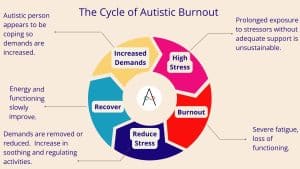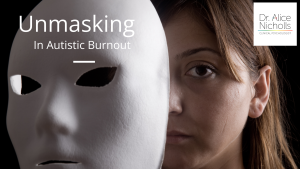Christmas can be a source of fun, connection and nourishment. It can also be a massive source of stress where we are expected to break away from our usual routines and sources of support.
In this article I will run through some of the most common festive challenges for Autistic people and some potential solutions or ways of coping.
1. Change in Routine
The Challenges
Whether you are employed, self employed, unable to work, running a household, in education or looking after children, it is likely that your day to day routine will change in some way over the festive period. It is common for schools, universities and workplaces to close or operate different opening hours. Your friends and family are likely to change their routines and this may well impact you too.
Changes in routine can make days feel unpredictable and can make it difficult to organise your usual day to day activities. For example, needing to go somewhere different or not go into work can mean your usual wake up time, washing routines, meal times and productive activities need re-organising. This can cause anxiety as you are no longer sure what to do and when. Maybe not going to work means you can’t get your usual lunch at the canteen, or having the children at home means you can’t easily go to the supermarket while it’s quiet.
The Solutions/Supports
Anticipating these changes at a busy time of year can be really stressful. It can help to talk your concerns through with other Autistic people on social media or in peer support groups. You might talk to a trusted friend or therapist. It’s important to acknowledge the stress these changes are causing and to appreciate that it is entirely understandable to feel this way. Most neurotypical people will report an increased level of stress around this time of year so for Autistic people, who already find change and unpredictability stressful this really is a challenge.
Although your usual routine will likely have to change in some ways there will be some parts of it you can keep. Think about the things that do not need to change and notice the things that are staying the same over the next few weeks. It might help to spend some time writing out a plan for the next few weeks. Planning out what you need to do and when can help you regain some sense of predictability. It will also enable you to foresee circumstances where you need to significantly change your daily routine and to plan how you might do that. You may find it soothing to also write out the first week where normality resumes and include your usual routine.
2. Loss of Usual Sources of Support
The Challenges
Maybe your usual therapist or support group is shut or perhaps you won’t be able to see a friend or colleague who you usually enjoy speaking to over the festive period. If you are receiving treatment for physical or mental health problems you might find that this stops or changes for a few weeks. If these interactions usually help you to feel cared for and less stressed then a decrease in them at a stressful time of year can feel particularly difficult.
The Solutions/Supports
If you are seeing a therapist or are receiving treatment for a physical or mental health problem it is worth asking your care provider to discuss what you can do over the Christmas period. They might be able to sit down with you and think about what you can do to maintain your health over the next few weeks. They might have ideas for other sources of support and they might have some ideas for exercises or therapies you can continue without them.
Consider whether there are other people in your life who you find supportive and plan to see them or have contact with them either via phone, zoom, text or social media.
Some autistic peer support organisations are continuing to run sessions over the Christmas period and some have facebook groups where you can become a member of their online community and speak to other people in a similar situation. Facebook has various groups for Autistic People and Twitter has a very active autistic community searchable using the hashtag #ActuallyAutistic.
3. Pressure to Socialise with Friends/Family/Colleagues
The Challenges
Covid-19 may have reduced the need for in-person parties, but chances are you will still be invited to a social event either in person or on zoom. Maybe work colleagues or old school friends will decide it would be good to mark the occasion and organise a social event. You might want to go and find the event enjoyable, you might find that while you want to go, it is adding to your overwhelm at a time where you are already struggling with stress. You may not want to go but find it difficult to communicate this and be stressed about how you are going to decline the invitation.
The Solutions/Supports
Take some time to think about whether or not you really want to attend each social event. Once you have decided whether or not you want to attend, consider whether there will be a cost to your energy levels and whether you can afford that cost. For example, if you really want to attend a meal out with work colleagues but know that your energy levels will be depleted for the rest of the week, consider what you want to prioritise. Would you prefer to go for the meal out and cut back elsewhere to make the week easier? Or would you prefer to save your energy and focus on the other activities you are committed to that week?
If it feels like a social event is going to cause you too much stress, without significant benefit, then it is okay to decline the invitation. If you really want to connect with the people offering the event but simply don’t have the capacity for it right now you could tell them that. For example ‘Im sorry I can’t make it, i’ve got alot on at the moment, I would love to catch up with you in January’ Or ‘I can’t make the meal out but I would love to do a video call with you one evening next week’.
If you find yourself in a situation where you’ve said ‘yes’ to too many events and are worrying about how you are going to cope with all of them you can cancel some of them. Think about the ones that are causing you the most stress and consider whether it is really important that you go.
4. Family Expectations
The Challenges
Families often have routines and rituals around Christmas, you might be happy with these and enjoy them, there might be problematic elements, or you may find the whole thing overwhelming. Maybe your mum expects everyone to come for christmas lunch or maybe you always put on a boxing day buffet. Family expectations have often been established over a long period of time and can feel very difficult to change even if they are making life incredibly difficult.
Solutions/Support
If a family tradition or an expectation is causing you undue stress you could address it directly. Starting with the ‘ I know we always do [x} and it is really important to you but I am finding it hard and I wondered if we could come up with some kind of compromise’. If it feels too difficult to be so direct you could put some limits or boundaries around what you commit to by saying when you need to be home, or that you can only do [y] this year. If you have a family who you find leaves you feeling depressed, anxious, victimised or scapegoated it is okay to avoid seeing them altogether.
5. Sensory Issues
The Challenges
Busy shops, fairy lights, several people talking at once and a neverending loop of christmas music playing in the background. These are just a few of the sensory challenges you might struggle with at christmas. Being expected to cope with more and/or different sensory input than usual can cause an increase in stress levels. You may also find you are less able to use your usual sensory strategies such as time alone, exercise classes or routines. Extra people using the bathroom might mean you don’t get so long in the shower or bath or you have to use it at a different time. You may find you want to wear different clothes or that there is an expectation for you to wear smart or festive clothing which can also lead to an increase in stress if you are sensitive to different fabrics and tightness of clothing items.
Solutions/Supports
If there are specific sensory inputs you really struggle with you could avoid having these in your house. If that is not possible you might negotiate that one room is kept free from sensory changes. Or that music is only played at certain times of day. You might find noise cancelling headphones help and having regular breaks useful. Making sure you have some of your normal foods in the house might help if you feel overwhelmed by festive meals. Let the people around you know if there are things they are doing that you find particularly difficult. For example: ‘I find it hard to listen to you when there is music playing in the background’, or ‘I’m sorry I can’t talk while there is so much background noise’, ‘the flashing lights are making me feel unwell, please can you change them to on or off’ . The people around you might make the changes you are asking for and they might be willing to compromise.
6. Too Much To Do And Too Little Time
The Challenges
In the run up to Christmas there is often a lot of pressure to get things ready for Christmas, whether that’s finishing jobs at work or in education, attending social events, buying and wrapping presents, preparing food or travelling to see friends and family. If you are someone who is often in or on the edge of autistic burnout these additional demands can feel like far too much.
Solutions/ Supports
Knowing how much extra you can manage is a real skill, which takes years to develop. If you find yourself in a position where you have taken on too much, please don’t criticise yourself for doing so. It is really hard to limit the demands placed on you. Where possible don’t take on things that are going to add too much stress, or look at other ways you can reduce your stress to make up for the new demands. Maybe use your annual leave to take a day off work so you can recover from the staff Christmas party. Or book a quiet day at home before you travel to see friends or family. Maybe you cancel some social events you would usually engage in and maybe you buy in ready meals for the week to prevent feeling overwhelmed. If you get to a point where you realise your week is looking too busy and overwhelming, don’t be ashamed to cancel events or commitments. You could say that you are not able to come because you are feeling unwell, because you have taken on too much or because you have realised you need to do something else instead.
7. Gift Giving and Receiving
The Challenges
Giving gifts can be a source of joy and an outlet for creativity, but it can also feel like another confusing set of social rules to navigate. Working out who to buy for, how much to spend and what to buy can feel confusing and overwhelming.
Maybe you find receiving gifts difficult, whether you are someone who struggles with having too much clutter or has specific tastes. You might find it difficult knowing how to respond when you don’t like a gift or feel awkward because you haven’t bought that person a gift.
Solutions/ Supports
It is okay to make up new rules around gift giving and receiving with your friends and family. You could suggest a budget or ask them for a wish list, you could start your own wishlist, either on amazon or by sharing a google document or something similar. If you find receiving gifts very difficult and would rather people didn’t you could tell them so. You could be less direct and ask if they would mind making a donation to a charity on your behalf instead of buying you a gift. If they are a valued friend or family member who you enjoy spending time with you could suggest that you both save your money and go out for a meal/ get a takeaway/ do something together with the money you would have spent.
If you find opening gifts in front of people difficult you could say that you are saving your presents for a specific time and place. If you are with friends or family on christmas day you could explain that you find gift opening stressful and suggest you do it alone or later. If surprises are particularly difficult you could ask gift givers to write down what they have got you on a slip of paper so you can find out in advance before you open the present.
8. Guilt and Shame
The Challenges
This article so far has covered some of the difficulties you might face as an autistic person at Christmas. They are normal concerns for an autistic person and mean that we need some help or at least, understanding, from the people around us to make Christmas more manageable for us. Many of my clients report feeling ashamed that they need adaptations made to family traditions and feel guilty when they ask. I also know some clients feel ashamed they feel unable to ask for changes and feel responsible for their own burnout at this time of year.
Solutions/Support
If you have read this far then I imagine this is not the first christmas you have found stressful. You have probably already tried multiple ways of making it less stressful and come up against barriers, either due to time, finances or the willingness of the people around you to make changes. You have done the best you can with the resources available to you. If you are struggling then it is not your fault. Making your life and big events like Christmas more manageable isn’t going to happen quickly. You are learning what you need and how to ask for it all the time. Hopefully this article will have given you some more ideas of sources of support and potential solutions. Consider making just one change this Christmas. If that feels too hard then that is okay too. You might find it helpful to share this article with a friend or relative and highlight the things that you are struggling with.
9. Preparation for Next Year
I’m aware that at the point of pushing ‘publish’ I’m putting this out there at least a week later than I would have liked. I pondered over whether I should wait and put it out next year instead. I decided to publish because, reading this now you might realise some of the things that are causing you difficulty this year that you can’t change now but you might be able to change for next year. While this Christmas might be too hard to change, now you can take note of all of the things you would like to be different and think about how you might change them for next year. It is always easier to do this while events are fresh in your mind, so take a few moments over the festive period and write or record your thoughts ready for next year.
I hope this article has been helpful and that you have an enjoyable Christmas however you choose to spend it. Wishing you peace and prosperity for 2024.
I specialise in working with people experiencing autistic burnout and I have written a blog series and an online course to help people recover from autistic burnout. For news of my latest posts and resources please follow me on Facebook or Twitter
-You might be interested in-
The Autistic Burnout Recovery Membership: A monthly subscription service for people who want to recover from and prevent Autistic Burnout. Click HERE for more details.











